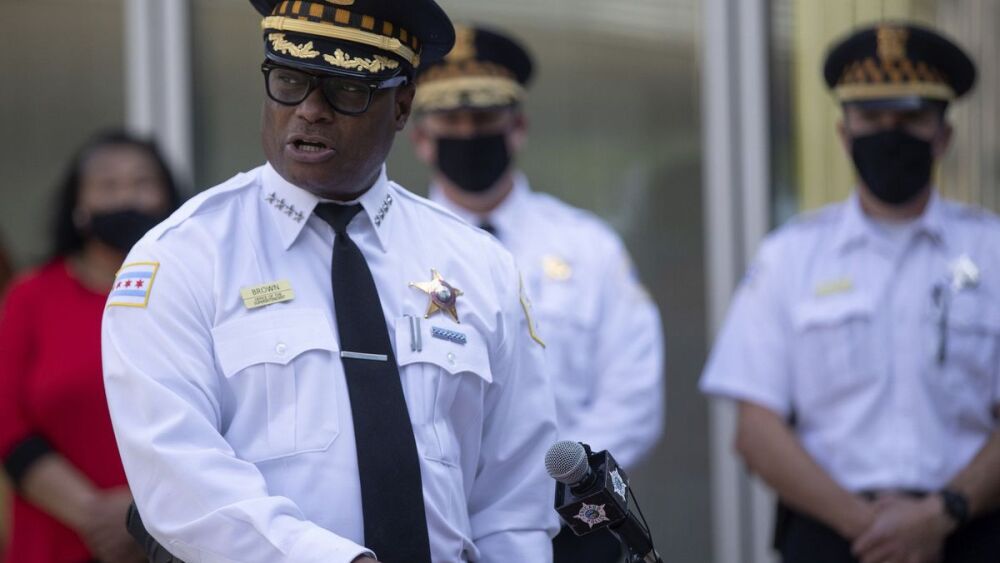By Paige Fry
Chicago Tribune
CHICAGO — Chicago police Superintendent David Brown announced Friday that the department will be distributing many of its community safety team officers — originally a roving citywide unit tasked with responding to neighborhoods experiencing upticks in violence — to specific units throughout the department.
The distribution of the community safety team officers is what Brown is dubbing a “precision deployment.” The officers will be moving to areas including the Area One homicide unit, the carjacking task force, gang investigations, the narcotics division, an intelligence work group focused on data-driven deployment and others.
“This is part of our strategy to continue our focus on gangs, guns and drugs with an emphasis on people, places and behaviors that drive both violence and public disorder in our neighborhoods,” Brown said at a news conference held at police headquarters.
“I just want to make sure we got the top line right: We’re going after gangs,” Brown said. “We’re going after gangs, and we’re going to do it constitutionally. We’re going to make sure we don’t violate anyone’s rights, but gangs are out of control in this city and we’re going after them to hold them accountable.”
Friday’s announcement also comes a little more than a month after a shooting in the South Side’s West Englewood neighborhood claimed the life of Officer Ella French and left her partner, Officer Carlos Yanez, badly wounded.
Both officers were working on the community safety team. The Tribune reported last month that the community safety team has been largely made up of newer, less-experienced officers. Yanez had joined the department in 2014 and French in 2018.
The move is also an acknowledgement by Brown that a key component of his crime-fighting efforts was not working effectively and in need of an adjustment.
Chief of Detectives Brendan Deenihan said 40 community safety officers will join the carjacking teams to help detectives. Brown did not immediately give a complete breakdown on how many community safety team officers will go to each unit, and the redistribution comes with no promised return to the original structure. Police spokesman Don Terry declined to disclose a breakdown on how the community safety team officers will be distributed, saying the department did not want to tip off potential criminals to its strategies.
“It is an expansion of the work the community safety team originally did to include a community safety team — community involvement integration — with the gang investigations, which is a new feature that we didn’t have before,” Brown said. “It was my concern with the saturation team, the gang enforcement team, the gun team, we had no community service component at all, and I thought that was short sighted. I believe every member of this police department needs to be involved in some type of community engagement for us to really gain the trust of people in communities.”
The move, Brown said, is to help the department focus in on gangs, and use intelligence and data-driven information to tackle complex criminal networks. Brown said the department’s controversial “gang database” is still in use, and the names in it “have been vetted” and those who think they were put on it erroneously will soon be able to appeal, likely to the police board, to have their names removed.
But the appeal process is still being finalized and is not currently available. The department’s lack of an appeal process was criticized earlier this year in a report made by the city’s Office of Inspector General.
The team was started last summer by Brown as violence across the city was spiraling out of control amid the COVID-19 pandemic and the civil unrest resulting from the police-custody murder of George Floyd in Minnesota. Brown had said he felt a citywide unit like the community safety team was necessary in Chicago, in part because police leaders have credited past similar efforts with helping tamp down crime in the city.
But even since July 2020, when the team took shape in some of the city’s toughest neighborhoods on the South and West sides, the violence has not let up. Through Labor Day, official police statistics show, Chicago recorded 540 homicides, 14 more than the same period in 2020, which ended with more than 760 killings — among the highest annual homicide tallies the city has seen since the 1990s. There have also been 3,043 people shot through Labor Day in Chicago, a jump of more than 9% compared to 2,781 a year earlier, the data shows.
Some police department sources have criticized top brass for allowing too many young and inexperienced officers to work on the community safety team. Some less experienced officers have been sent to the team when there simply weren’t enough volunteers, finding themselves working in districts they aren’t used to.
Brown and the team have also faced criticism in a lawsuit for allegedly using quotas to increase police activity where the community safety team patrols.
The team started out with about 300 cops before swelling. By early 2021, the unit had over 800 officers. The department couldn’t immediately say how big the unit will be once officers from there are shifted to the new assignments in the counterterrorism bureau.
By moving more officers into the bureau, however, Brown will be building on another crime-fighting strategy he instituted last year by moving officers into the citywide narcotics unit so that they could focus on investigations into the people a department spokesman described as “midlevel” and “upper-level” drug dealers.
Last year, Brown shifted hundreds of cops from neighborhood patrol duties and other units to the community safety team, and began beefing up narcotics, as part of a reversal in strategy from his immediate predecessor, interim police Superintendent Charlie Beck.
In January 2020, Beck had moved hundreds of cops from narcotics and gang unit assignments to patrol duties as part of a sweeping reorganization of the department.
©2021 Chicago Tribune. Visit chicagotribune.com. Distributed by Tribune Content Agency, LLC.


